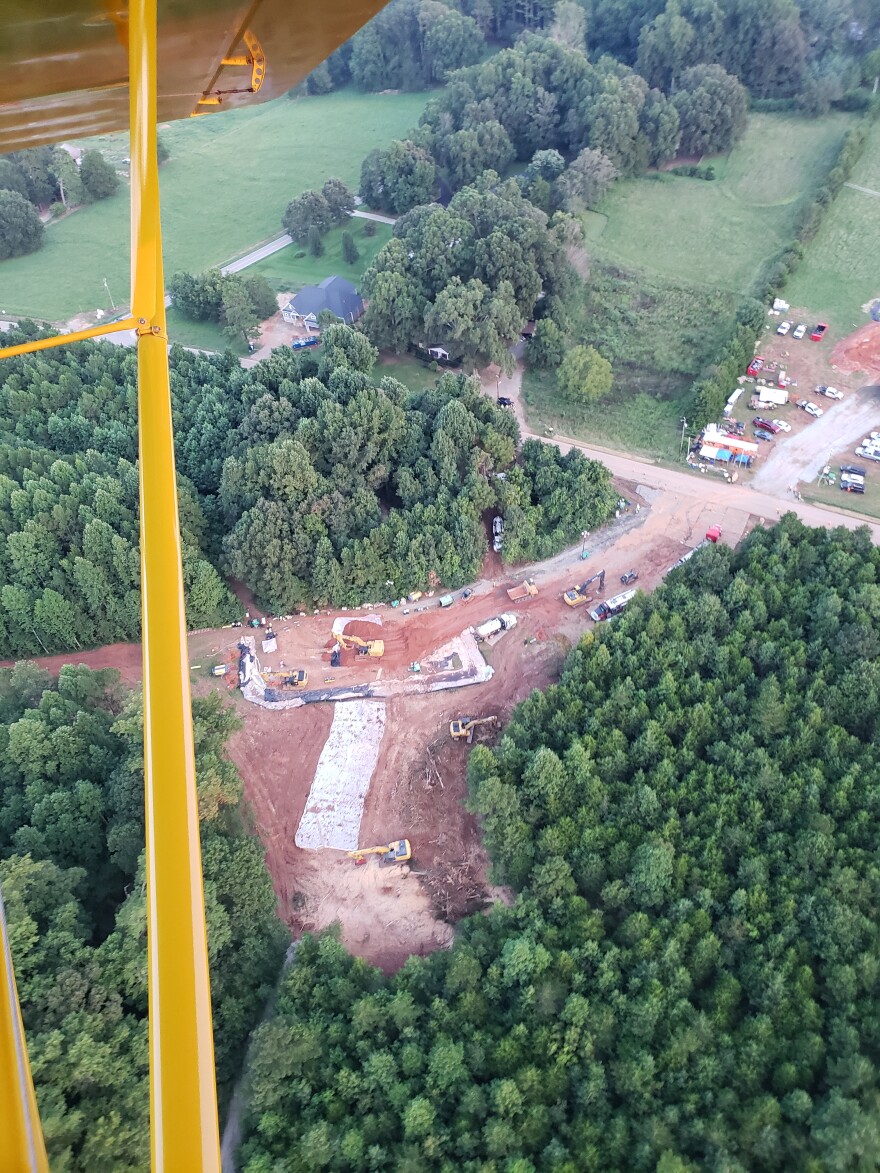More than 60,000 gallons of gasoline leaked from a pipeline in Huntersville a few weeks ago. Town officials there are holding a public meeting Thursday to answer questions about the leak. The incident has left residents frustrated with the pipeline company and the town.
Huntersville-Concord Road is a rural two-lane road that connects a number of far-flung neighborhoods to Huntersville. Dozens of trucks lined the side of that road recently as workers dug into the ground to fix a leaking pipeline.
That pipeline is two parallel pipes, each about three feet wide. They’re part of a line that runs petroleum products from Houston to New York City. One of the pipes is dedicated for gasoline; the other is a number of different products, including gasoline, jet fuel and home heating oil.
Colonial Pipeline said 63,000 gallons of gasoline were released from one of the pipes on Aug. 14. That’s the equivalent of at least five large tanker trucks.
This isn’t the first time this pipeline has had trouble. It was shut down back in 2016, after a gasoline leak happened just outside of Birmingham, Alabama, releasing about 250,000 gallons.
Workers have fixed the leak that started two weeks ago in Huntersville. When asked about the cause of the leak, Colonial Pipeline's vice president of operations services, Angie Kolar, said the company was still investigating.

"Right now, we’re still in the analysis phase. As was mentioned earlier, the first step is making sure that we’re protecting the responders and the public," Kolar said. "And so now that the pipe has been repaired, the next phase is going in on the analysis side and trying to figure out what happened."
When gasoline leaks like this happen, the state’s Department of Environmental Quality requires companies to test drinking wells in a radius of up to 1,500 feet around the site. Colonial Pipeline said it expanded that radius.
But it didn’t include Pavilion Estates, a smaller neighborhood of 22 homes off Huntersville-Concord Road. Several residents there are concerned about the impact the leak could have on their wells, including Jake Cohen.
"We all have wells," Cohen said. "Every single house in this neighborhood has well water."

Cohen stood outside the entrance to Pavilion Estates, where the pipeline runs past.
"So, to not know whether or not your well is going to be affected short-, medium- or long-term, is scary. I mean, we’ve got kids. How do we handle that, right?" Cohen said.
Residents like Cohen were frustrated by communication from Colonial Pipeline, which they said has been confusing, misleading, or lacking in detail. The company has an incident response website set up where it posted updates every few days.
Residents weren't happy with communications from the town of Huntersville, either. Rick Lyke also lives in Pavilion Estates. Colonial Pipeline tried to meet with him one-on-one after he contacted town officials -- but Lyke refused because he wanted a public meeting instead.

"Our town government seems to be totally lackadaisical at this moment," Lyke said. "The town of Huntersville is parroting what the Colonial Pipeline people send to them."
Huntersville Mayor John Aneralla said he thinks he’s answered everyone’s questions. He set up a town hall meeting after several requests. Aneralla said the town government doesn’t have the technical ability to lead the cleanup, which lies with the state and county agencies involved.
"The town is pushing out information from Colonial Pipeline Company, as well as from the agencies that are in charge of overseeing the cleanup," Aneralla said.
Mecklenburg County Public Health has reported it didn’t think the gas leak affected well water. However, the department also told WFAE that it doesn’t know what future impact could be on wells or stormwater, and that it will require continuous monitoring. That’s something Brad Johnson, a geologist and soil scientist at Davidson College, said needs to be done.

"A lot of this stuff is unknowable unless you’re sampling it actively. In some ways, you’re playing a game of odds," Johnson said. "The closer you are, the higher the odds that there’s a problem.”
While the farther away you live, Johnson said, the less likely your well is contaminated.
"If you can get a complete circle around it and those don’t have any in it, then you can be pretty confident that it’s not outside that circle," Johnson said.
Johnson said Colonial Pipeline should be testing for a number of months, ideally with a third-party lab. Colonial said it’s chosen Pace Analytical Laboratories in Huntersville for its well testing. Cohen and others in the Pavilion Estates neighborhood said they still want answers, and wanted to make sure that Colonial and government regulators monitor the groundwater for as long as there’s any risk to the area from this leak.
The community meeting about the pipeline leak is set for 5:30 p.m. Thursday at the Huntersville Recreation Center. Town officials said there is an attendance limit of 80 people and a mask requirement.
Want to read all of WFAE’s best news each day? Sign up for our daily newsletter, The Frequency, to have our top stories delivered straight to your inbox.



